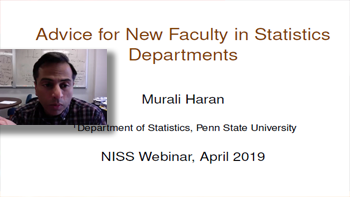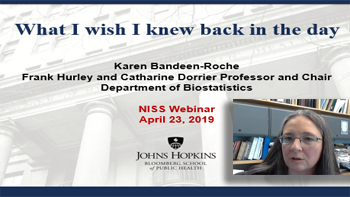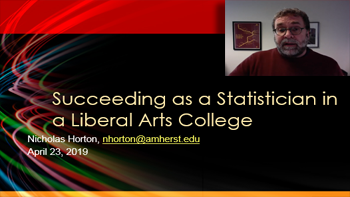


The NISS Affiliates Committee held the third of its virtual meet-ups on April 23. The first two meet-ups targeted landing a job and improving communication skills. This last meet-up asked experienced and veteran statisticians, from three very different academic environments, what their advice and council would be to help promote the success of the careers of junior faculty in statistics. Speakers responded to the statement: “Things I Wish I Knew at the Start of My Career”!
Sharing a wealth of experience from each of their different academic settings, the speakers for this event were Murali Haran (Penn State, statistics department in large research university), Karen Bandeen-Roche (Johns Hopkins, biostatistics department) and Nicholas Horton (Amherst College, small liberal arts college). Biographical sketches of each of these distinguished individuals is included below.
Dr. Murali Haran began his remarks by emphasizing the importance of thinking long term as advice for building ones career. Murali encouraged junior faculty to become involved in things that they enjoy, to build collaborations, to talk with colleagues, give talks, attend seminars, finish papers, go to conferences, submit grants etc. However, he well knows and advises his own faculty that you can’t do everything! The important difference, stated Dr. Haran, is that you need to bring the following skills to your efforts: the ability to make good decisions in terms of choice of research projects and writing, be able to manage your time properly and finally to be willing to learn from the examples of those that have come before you.
Dr. Karen Bandeen-Roche remarks were a powerful complement to the advice that Dr. Haran shared. She traced the trajectory of her career from assistant professor to department chair of the Biostatistics Department at Johns Hopkins. In doing so, Karen shared that at one point she experienced a very tough segment where she was doing exactly what she should not have been doing – everything, for everybody else – and even though she was winning prestigious awards it was wearing her down both emotionally and physically. Eventually, after reaching out to family and mentors, her career was back on track and rebounded wonderfully. As a result, her first-hand experience that taking health (all kinds) seriously, highly prioritizing pursuing one’s own academic passions and interests, finding times for other things than academics, and developing a career mentor are all important strategies that she stressed as part of her comments.
Dr. Nicholas Horton was the final speaker of the session. He geared his remarks towards helping us understand the shift that is occurring in undergraduate institutions in terms of statistics and data science and ways that faculty at smaller schools balance teaching and scholarship. Changes in the curriculum at his institution as well as co-curricular opportunities such as the Statistics and Data Science Fellows program, DataFest, and StatFest were examples of ways to help expose students develop skills and capacities. It is also clear that Nick’s connection with students are what has driven his passion for teaching and research and have marked his career accomplishments.
All three speakers spent time at the end of the session responding to questions from attendees, providing further advice and remarks.
Here are a few take-aways from the session that we thought are important to share right away.
- Make sure you build in time in your schedule to work regularly on your own research (e.g., from 8 – 11 am: no email, no meetings, just research) and do the research at a time of day when your mind is the freshest
- Learn by example (study successful grant applications; high impact papers) and get mentors for different aspects of your career development (research, teaching; mentors can be outside of the institution too)
- Everyone experiences professional and personal challenges, setbacks and failures—have to persist and keep trying, and get help when necessary!
- Get yourself out there---go to conferences, give talks, be active in professional societies. These relationships that you build outside of the institution are so valuable for career development and fulfillment.
- And above all, don’t neglect your mental and physical health. Important to make time for hobbies, relaxation, and try to achieve a work/life balance.
NISS invites you to view a recording of the entire session below in order to really appreciate all of the thoughtful remarks and advice from each of these knowledgeable individuals:
Speakers slides available here:
Dr. Haran - "Advice for New Faculty in Statistics Departments"
Dr. Bandeen Roche - "What I Wish I Knew Back in the Day"
Dr. Horton - "Succeeding as a Statistician in a Liberal Arts College"
NOTE: Please be sure to provide the proper attribution for the author's work if these slides are used for teaching or other purposes.
SPEAKERS
Dr. Murali Haran is Professor and Head of the Department of Statistics at Penn State University. He is a Fellow of the American Statistical Association, received a Young Researcher Award from The International Environmetrics Society to ``recognize and honor outstanding contributions to the field of environmetrics'', and received the Young Investigator Award given by the ASA Section on Statistics and the Environment. His research interests are in Markov chain monte carlo algorithms, spatial models, and environmental and ecological statistics. He has been on the editorial boards of a number of leading journals including Biometrics, Bayesian Analysis, and the American Statistician. Murali became Head of the Department of Statistics at Penn State in 2018.
Dr. Karen Bandeen-Roche is Hurley Dorrier Professor and Chair of the Department of Biostatistics at the Johns Hopkins Bloomberg School of Public Health. Karen’s primary statistical research areas are multivariate, latent variable regression modeling, the study of classification and variance structure and multivariate survival analysis. She is a Fellow of the ASA, has received several awards for outstanding research in ophthalmology and aging, and has been recognized for excellence in teaching and mentoring by Johns Hopkins University. She has been Associate Editor of Biometrics and Journal of the American Statistical Association, was past president of ENAR, past chair of the NIH study section for biostatistical methods, and has held numerous other leadership positions in professional organizations. She has been Chair of the Department of Biostatistics at Johns Hopkins since 2008.
Dr. Nicholas Horton is Beitzel Professor in Technology and Society in the Department of Mathematics and Statistics at Amherst College. Nick is the recipient of numerous awards and honors including Fellow of the American Association for the Advancement of Science, Fellow of the ASA, the Founders Award for Distinguished Service from the ASA and the Lagakos Distinguished Alumni Award from the Harvard School of Public Health. His statistical research focuses on the development of approaches to account for multivariate response models, longitudinal studies and missing data. He has taught a variety of courses in statistics and related fields, including probability, mathematical statistics, regression and design of experiments and has received excellence in teaching awards from the Mathematical Association of America, Mu Sigma Rho, and the ASA.
A special thank you to Dr. Mimi Kim (Albert Einstein College of Medicine) who served as organizer and moderator of this session.
